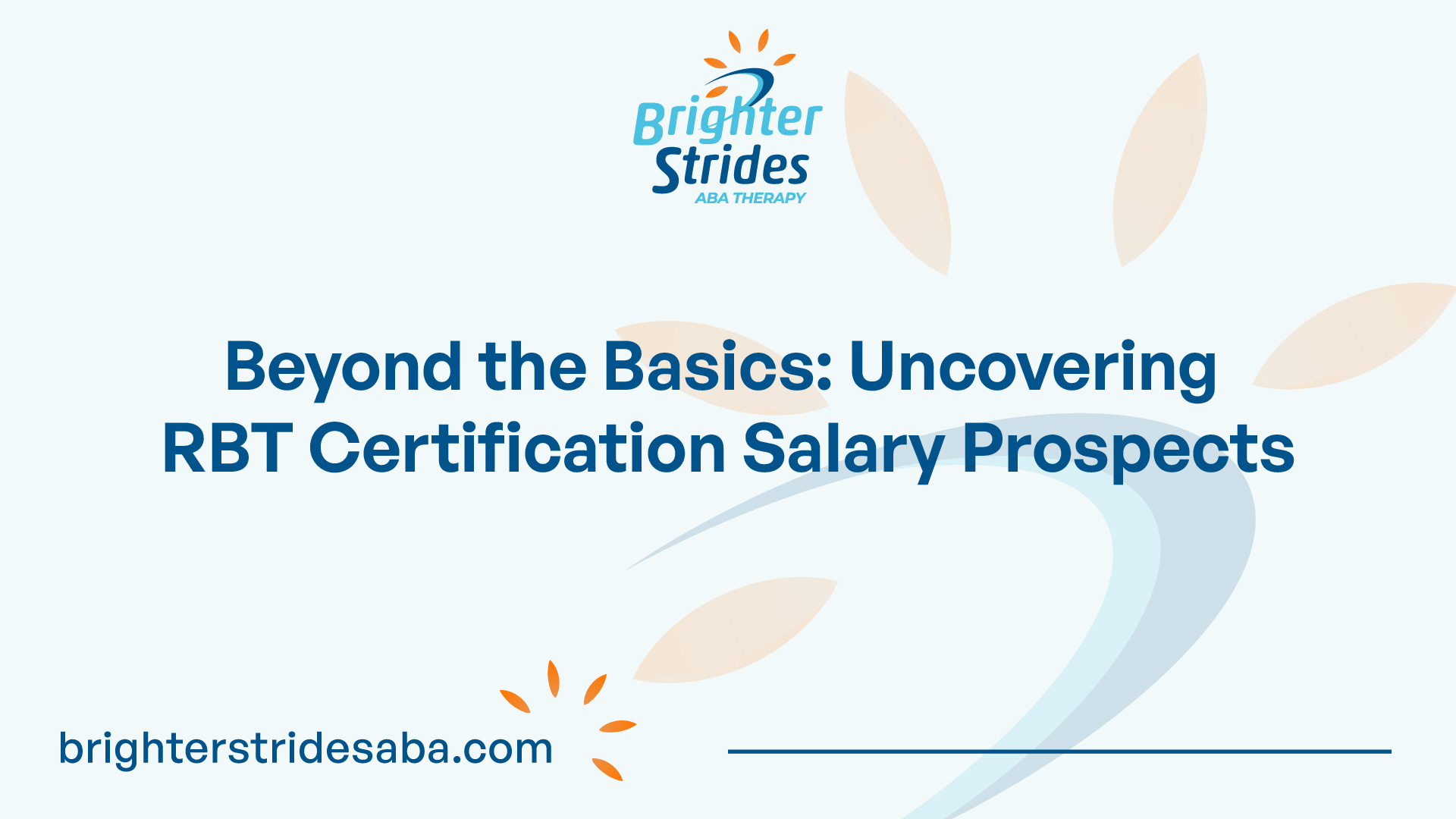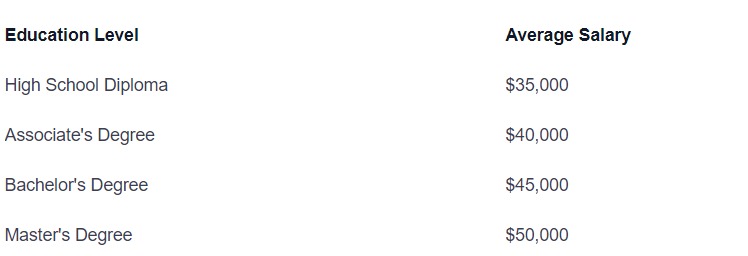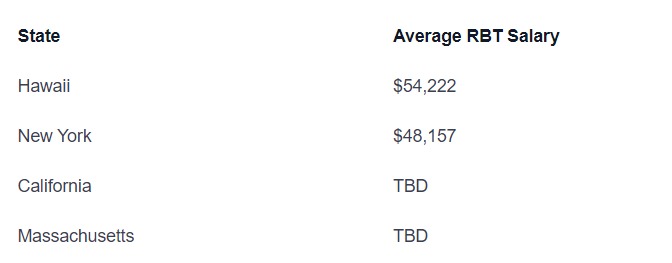Understanding RBT Certification
Before delving into the salary and compensation of Registered Behavior Technicians (RBTs), it’s important to understand what an RBT certification is and what the process of becoming an RBT entails.

What is RBT Certification?
Registered Behavior Technician (RBT) Certification is a professional credential that qualifies individuals to implement Applied Behavior Analysis (ABA) services. RBTs work under the close supervision of Board Certified Behavior Analysts (BCBAs) and provide direct therapy to individuals, often children, with Autism Spectrum Disorder (ASD) or other developmental disorders. RBT certification is granted by the Behavior Analyst Certification Board (BACB) and is recognized nationally in the United States.
RBTs play a pivotal role in the implementation of ABA therapy. They work one-on-one with clients, applying the principles of ABA to teach new skills and reduce problematic behaviors. The goal of ABA therapy, and consequently, the work of an RBT, is to improve the quality of life of the individuals they serve by increasing useful behaviors and reducing those that may cause harm or interfere with learning.
The Process of Becoming an RBT
Becoming an RBT involves a multi-step process, beginning with meeting the eligibility requirements. These typically include being at least 18 years old, having a high school diploma or equivalent, passing a criminal background check, and completing a 40-hour RBT training course.
Following the completion of the training course, applicants are required to pass the RBT Competency Assessment, conducted by a qualified BCBA or BCaBA. This assessment evaluates the applicant’s ability to apply the skills learned during the training course, including the implementation of ABA programs and the management of problematic behaviors.
The final step in the process is passing the RBT exam, a computer-based test that assesses the applicant’s understanding of the RBT Task List, a document outlining the key skills and knowledge areas required for the role. Upon successful completion of the exam, the applicant is granted RBT certification.
Becoming an RBT can open up new career opportunities and provide a pathway into the growing field of behavioral health. In the following sections, we will explore the potential salary prospects for RBTs and consider the factors that can influence these earnings.
Analyzing the RBT Salary Range
Understanding the potential earnings of a Registered Behavior Technician (RBT) is a key consideration for those interested in pursuing this certification. Here, we delve into the average RBT salary, entry-level earnings, and the potential income for experienced RBTs.
Average RBT Salary
The average RBT salary in the United States is approximately $54,000 per year, according to Cross River Therapy. However, it’s important to note that this figure can vary significantly based on several factors, such as geographic location, level of experience, and the specific work setting.
Another source, PayScale, provides a lower average figure, stating that the average RBT annual salary is under $35,000, or $17.02 per hour. These differences underline the importance of considering multiple data sources when researching salary expectations.
Entry-Level RBT Salaries
For those new to the field, entry-level RBT salaries begin at around $47,000 per year, as reported by Cross River Therapy. While this is lower than the overall average, it provides a solid foundation for growth and advancement as RBTs gain more experience and further their education.
Salaries for Experienced RBTs
As RBTs gain more experience in the field, their earning potential increases. RBTs with a significant amount of experience can earn over $66,000 per year, with Cross River Therapy indicating that after a decade of work experience, an RBT’s salary can range between $50,000 to more than $65,000 per year.

These figures highlight the potential for financial growth within the field, making RBT certification a worthwhile investment for those interested in a rewarding and meaningful career in behavior analysis.
Factors Influencing RBT Salaries
The salary of an individual with an RBT certification can vary widely due to a number of factors. Here, we’ll explore the impact of geographic location, the role of experience and education, and the influence of work settings and industry on RBT salaries.
Impact of Geographic Location
The geographic location of employment can significantly impact the salary of an RBT. Factors such as the cost of living and demand for RBT services can cause salary ranges to fluctuate in different regions. Urban areas with higher living expenses and a greater demand for behavioral services often offer higher salaries for RBTs.

These figures are average estimates and actual salaries can vary depending on specific circumstances and local market conditions.
Role of Experience and Education
Experience and education are crucial determinants of an RBT’s salary. RBTs gaining more experience and higher levels of education often command higher salaries compared to those with less formal education. Specifically, pursuing advanced education in applied behavior analysis (ABA), such as obtaining a bachelor’s degree or higher, can lead to higher-paying opportunities for RBTs.

Experience also plays a significant role in salary prospects. On average, RBTs with 5-10 years of experience can expect to earn significantly more than those just starting in the field.
Influence of Work Settings and Industry
The work setting and industry in which an RBT is employed can also impact their salary. Different settings and industries offer different salary structures and benefits. For instance, RBTs working in a private practice might earn a different salary compared to those working in a school setting or a community mental health center.

As an RBT, understanding these influencing factors can help you make informed decisions about your career path and potential earnings in the field. It’s important to consider all these aspects when evaluating the financial benefits of earning an RBT certification.
Advantages of RBT Certification
Becoming a Registered Behavior Technician (RBT) comes with several benefits, including job growth prospects and the potential for higher pay. These advantages, combined with the impactful work that RBTs do, make this certification a valuable pursuit for anyone considering a career in the field of applied behavior analysis.
Job Growth Prospects for RBTs
One of the significant advantages of obtaining an RBT certification is the positive job growth prospects in the field. The job growth rate for RBTs over the next 10 years is projected to be 12% to 22%, which is significantly higher than the average job growth rate of 5%. This growth rate suggests that there will be a continued demand for RBTs, providing job security and opportunities for career advancement.

Higher Pay Potential with RBT Certification
Another advantage of RBT certification is the potential for higher pay. The salary for RBTs can vary greatly depending on factors such as education, experience, and location. However, there is the potential for earning a higher salary with more experience and education.
Experience and education play a significant role in determining RBT salaries, with RBTs with more experience and higher levels of education often commanding higher salaries . For instance, pursuing advanced education in applied behavior analysis (ABA), such as obtaining a bachelor’s degree or higher, can lead to higher-paying opportunities for RBTs.
Continuing education, certification, and career advancement can have a direct impact on salary growth for RBTs. Higher levels of education, specialized training, and advanced certifications can increase the earning potential.
Furthermore, RBTs with more experience tend to earn higher salaries than those who are just starting out. The highest-paid RBTs can make upwards of $54,000 per year, according to PayScale.
In conclusion, obtaining an RBT certification can open up a range of opportunities and advantages, including a higher-than-average job growth rate and the potential for increased income. For those interested in a career in applied behavior analysis, an RBT certification can be a valuable stepping stone towards a rewarding and fulfilling career.
RBT Salaries in Different States
The income of a Registered Behavior Technician (RBT) can significantly vary depending on the state in which they are employed. Below, we’ll explore the top paying states for RBTs and delve into the variances in state-level RBT salaries.
Top Paying States for RBTs
Each state has its own specific demand for RBTs and different cost of living, which can impact the salary range. According to Cross River Therapy, Hawaii is the state that pays RBTs the most, with an average salary of $54,222 per year.
Following Hawaii, New York is another state that pays RBTs a higher than average salary, with an average income of $48,157 per year. RBTs working in California and Massachusetts also tend to earn higher salaries than those working in other states.

*specific salary figures for California and Massachusetts are not provided in the context.
Variances in State-Level RBT Salaries
The variances in RBT salaries across different states can be attributed to several factors. These include the cost of living in the respective state, the demand for RBT services, and the level of competition in the field.
The average salary for an RBT in the United States is $39,520 per year, according to the Bureau of Labor Statistics (BLS). However, the highest-paid RBTs can make upwards of $54,000 per year (Golden Steps ABA), indicating a significant variance in income based on the state of employment.
It’s also important to note that these figures represent averages and that individual salaries can vary based on factors such as years of experience, additional certifications, and specialized skills.
Understanding these salary variances can be crucial when considering the potential benefits of pursuing RBT certification. It’s always beneficial to research the specific salary ranges in your state or the state where you intend to work to make an informed decision.
Conclusion
As we’ve explored in this article, the salary prospects for Registered Behavior Technicians (RBTs) can vary significantly based on several factors. However, pursuing RBT certification can lead to a rewarding and fulfilling career with potential job growth and higher pay. By understanding the impact of geographic location, education level, experience, and work setting on RBT salaries, individuals can make informed decisions about their career paths.
It’s also important to note that these salary ranges are subject to change over time as demand for behavioral health services shifts. Nonetheless, the potential financial benefits and meaningful work make RBT certification an attractive option for those interested in behavior analysis.
Overall, RBTs play a vital role in supporting individuals with developmental or behavioral challenges, and their contributions are highly valued by clients and communities alike. As such, pursuing RBT certification is not just a financially sound decision but also one that can provide immense personal fulfillment through making positive impacts on others’ lives.
Sources
- https://www.crossrivertherapy.com/rbt/average-salaries
- https://www.glassdoor.com/Salaries/registered-behavior-technician-salary-SRCH_KO0,30.html
- https://www.bls.gov/ooh/community-and-social-service/mental-health-counselors-and-marriage-and-family-therapists.htm#tab-6
- https://www.payscale.com/research/US/Certification=Registered_Behavior_Technician_(RBT)/Salary
- https://www.ziprecruiter.com/Salaries/RBT-Salary




